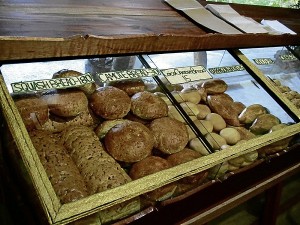MANILA, Philippines—Bakery owners and flour importers are seeking to postpone the evaluation of the proposed tariff increase on imported Turkish flour to January 2014, as this will enable affected stakeholders to better manage their supplies, and ensure stable prices for bread and noodles.
Ernesto Chua, chair of the Filipino-Chinese Business Council and president of flour importer Malabon Longlife Trading Corp., said it would be better for the Department of Agriculture to conduct the evaluation of the tariff case during the “lean months” of January to March, when no shipments of Turkish flour are expected.
The postponement will also allow flour importers to better plan their shipments of Turkish flour for the rest of the year. As it is, Malabon Longlife has already stopped importing this kind of flour, whose tariff is being petitioned to increase to 20 percent from the current 7 percent.
According to Chua, the last batch of their Turkish flour orders are expected to arrive by August, and none are expected for the rest of the year, pending the decision of the DA. He said it would be difficult for companies like them to keep importing Turkish flour at the risk of tariffs being raised, should the government give in to the petition of the Philippine Association of Flour Millers (Pafmil).
Earlier this week, Pafmil renewed its push for a tariff increase on imported Turkish flour, even as bakers warned that this would push up bread prices by as much as 15 percent.
This impending price hike is equivalent to a P1 increase in the price of bread and around 50 centavos for the Pinoy Pandesal bringing it to P3.50 per piece. Produced by small neighborhood bakers, Pinoy Pandesal is the brand name of affordable bread products that use the cheaper Turkish flour.
“There is no urgency to decide on this petition since the flour millers earned well last year, proof that they were not affected by Turkish flour imports,” Chua stressed.
The DA is expected to start evaluating the petition of Pafmil by August, as it has given another 15 days to all affected stakeholders to submit their comments. The 15 days began on Wednesday this week, after which the DA will start the evaluation, which is expected to last for a month, according to Agriculture Assistant Secretary Salvador Salacup.
The DA will then forward its recommendation to the Tariff Commission for final evaluation.
Pafmil and the bakers group, represented by the Filipino-Chinese Bakery Association Inc. (FCBA), are at odds over the proposal to hike tariffs on Turkish flour.
Currently, Turkish flour costs about 30 percent (P200) less than locally milled flour and is preferred by bread and noodle makers, according to a statement issued earlier by the FCBA.
The group of bakery owners or producers of bread, noodles, cakes, pastries, pizza, siopao, pandesal, cookies and biscuits disclosed that hard flour or bread flour from Turkey was sold at P700 per 25-kilogram bag, while soft flour costs P620 per bag. In contrast, the price of locally milled flour costs anywhere from P900 to P950 a bag.
Since flour represented more than 50 percent of the cost of bread production, an increase in the price of flour would automatically translate into higher bread prices.
Pafmil, however, stressed that Turkish flour millers are exporting flour to the Philippines “at dumping prices which is in violation of World Trade Organization rules.” This puts local millers to a disadvantage.
Pafmil also said that Philippine importation of Turkish flour grew by 16 percent in 2011 and by 71 percent in 2012, while the local flour industry grew by only one to 2 percent during the same periods. If this trend were to continue, there would no longer be a flour milling industry in the Philippines in just a few years and should this happen, the entire country would be left at the mercy of Turkey for its flour supply, Pafmil earlier claimed.
Chua pointed out, however, that Turkish flour represented only 9 percent of total supply in the country, while the bulk of the volumes (89 percent) was still being supplied by Pafmil member companies.
